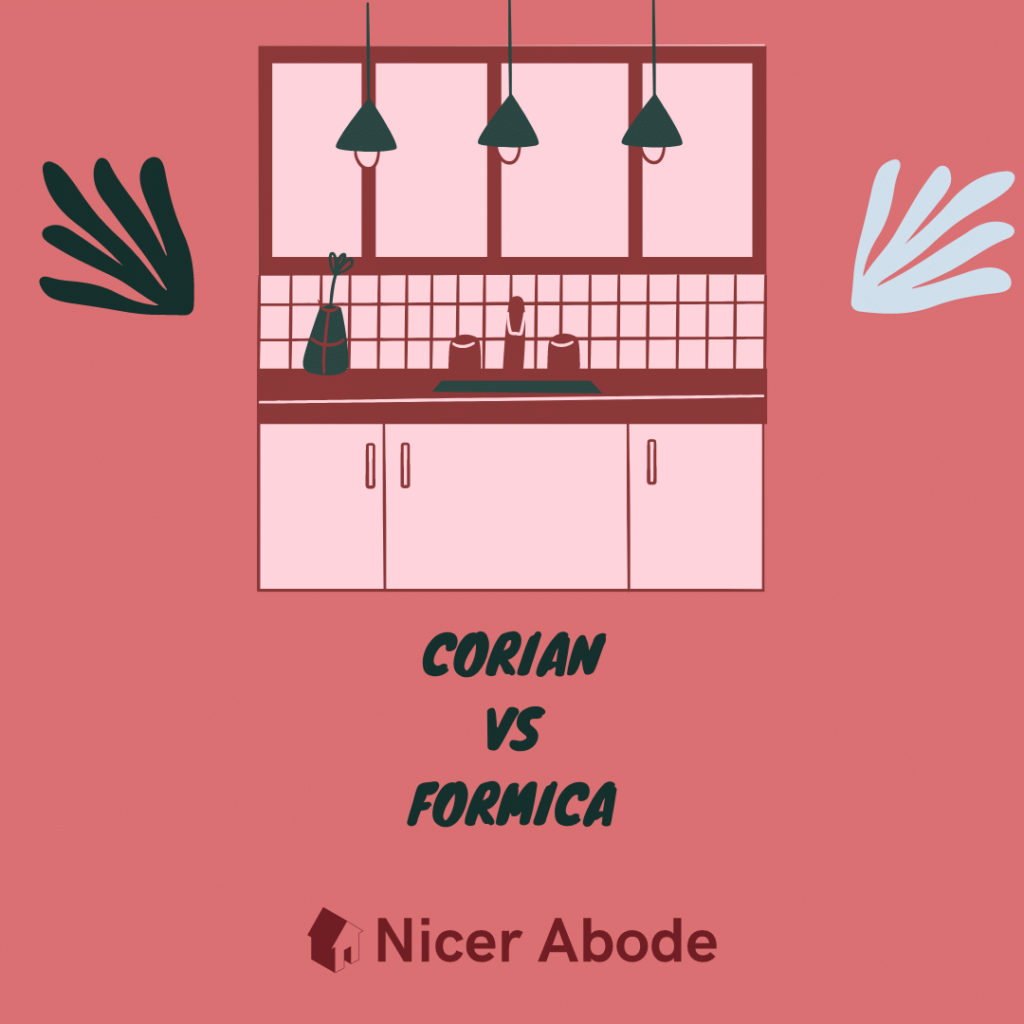On today’s menu – Corian vs Formica countertops. Which is better?
Let’s get started.
Differences Between Corian and Formica
The table below shows the differences between Corian and Formica based on seven benchmarks. To decide which would be best, I would advise choosing one that meets your project requirements.
| Corian | Formica | |
|---|---|---|
| Cost (per sq.ft.) | $45 – $65 | $20 -$50 |
| Maintenance | Low maintenance. The surface is non-porous and needs no resealing. | Easy maintenance. The surface is non-porous, but the seams can cause water to seep through. |
| Durability | Strong and durable. It can last up to 30 years. You can fix surface damage. | Becomes chipped with time. Needs replacement about every 10 years. You cannot fix surface damages. |
| Install | Easy installation; you will need quite a few tools. | Easy installation. A strong adhesive, filer, and a circular saw are almost all that you will need. |
| Water resistance | 100% water-resistant. | Resistant to water, but it can seep in through the seams. |
| Heat resistance | The glossy appearance can get damaged after contact with excessive heat (>212° F). | Susceptible to excessive heat (>150۠° F). Prone to burning and melting. |
| Staining | Stain-resistant | Cannot resist tough stains. |
What is Corian?
A brand by DuPont, Corian is a man-made solid surfacing made of acrylic-based materials. It is used broadly as countertops or benchtops.
You can fasten Corian to other materials using silicone adhesive. They are found in thicknesses of 6 mm, 12 mm, and 19 mm. You can achieve any desired width by sticking together a combination of these.
Corian countertops now come in many colors, so people can style them as they wish. Since they are relatively soft, they are not scratch resistant.
What is Formica?
Formica is a laminate, solid surfacing made of polyester-based materials. It was first made to be used as an electrical insulator.
The Formica laminates can come in smooth, glossy, matte, and hard textures. It has been widely used as countertops, furniture lamination, and protective layers. Formica laminates are one of the most affordable countertop materials.
The thickness of Formica varies from 2 mm to 20 mm. It came with decorative designs and was very popularly used when it was first introduced. The best advantage of Formica is that it is affordable, and you will get many design options to choose from.

Pros and Cons of Corian Countertops
Pros
- You can repair almost any damage.
- Maintenance and cleaning are easy.
- Available in many different colors and designs.
- It is a cheaper option than Granite or Quartz countertops.
- You can design it in any shape.
- Corian can conduct electricity, so you can charge your mobile devices using the charging surface technology.
- No additional sealing is required as the surface is non-porous.
Cons
- Since the surface of Corian countertops is soft, it is not scratch resistant.
- The surface can burn when in contact with extremely high heat.
- It is susceptible to discoloration by chemicals in cleaning products.
Pros and Cons of Formica
Pros
- It comes in many different designs, giving you more options to choose from.
- Formica is one of the most affordable countertop options in the market and still gives a decent lamination.
- You have complete control over the installation process; cut the sheets into any shape and make a unique masterpiece each time.
- Additional sealing is not required as the surface is non-porous.
Cons
- Formica laminates can get worn out with time; you will need to replace them every couple of years.
- It is not scratch resistant.
- Apart from minor scratches, you cannot repair other damages such as cuts and deep scratches.
- Water and moisture can seep through the seams and damage the furniture underneath.
Tips to Care For Your Solid Surfaces
Both Corian and Formica laminates do not come with the designs and colors they are sold in. They need proper care so that their appearance does not degrade over time.
Avoid frequent use of strong chemicals. It can quickly cause discoloration on the countertop surface. Heat is another factor that can contribute to surface damage.
You can opt for a milder option like soapy water to clean the surfaces. Be sure to wipe the surface with a clean, dry cloth so that no white residue is left on the surface.
Other Things To Know About Corian and Formica
Which is better?
If you weigh the differences, you will notice that Corian performs much better in almost all categories.
Are Corian countertops out of style?
Corian countertops have lost their popularity to the more durable and functional Quartz and Granite.
Which is better suited for countertops?
Since countertops usually are in contact with hot pots and pans and water, Corian would be a better option than Formica.
Which is more water-resistant?
Corian is more water-resistant than Formica.
Which is more heat resistant?
Both Formica and Corian are heat-resistant, but their quality can degrade with excessive heat.
Which is more resistant to stains?
Corian performs slightly better in stain resistance.
Which is easier to clean and maintain?
Both are easy to clean. Formica cannot be repaired once damaged, and Corian can be repaired and is easier to maintain.
Price Comparison
Corian costs $45 to $65 per square foot, whereas Formica costs $20 to $50 per square foot. The Corian vs. Formica cost shows that Corian is comparatively expensive.